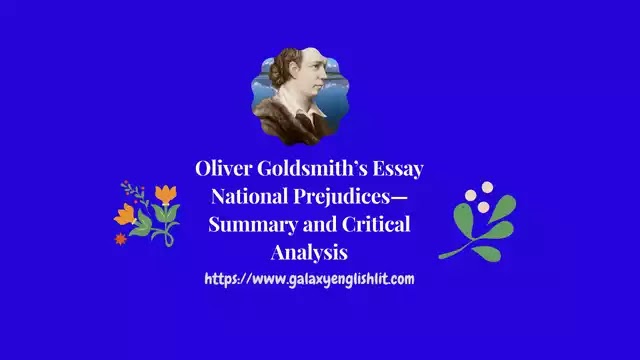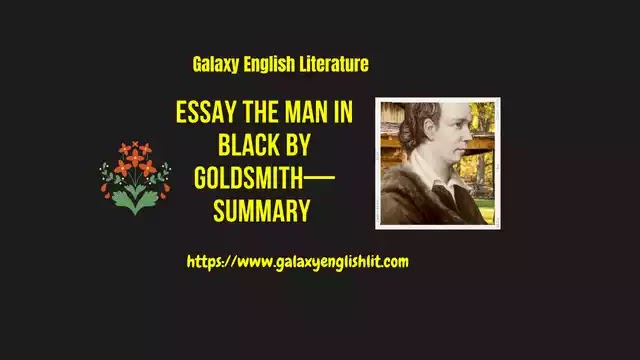Eliot's Characters Drawn from the Aristocratic or the Upper Middle Class:
Eliot could achieve remarkable success in language and versification; his characters are usually stock characters, flat and unchanging. They are not individualised. They have all a sort of family likeness. They are all drawn from the same social state. They belong either to aristocratic or the upper middle class. They are usually divisible into two broad categoric, characters who are flat, dull and insensitive, and characters with unusual spiritual insights, remote from everyday experience, and so difficult to comprehend. They all lack life reality. They are altogether too cerebral, creations of the mind, unimpelled by emotions of their own.
 |
| Eliot's Technique of Characterization in The Family Reunion |
Eliot's Much Attention to Versification:
Eliot himself was conscious of these shortcomings and so once remarked that, “He had given too much attention to versification at the expense of character.” He considered Harry, the chief protagonist of The Family Reunion to be a Prig and was of the view that the poetry of the play was the best part of it. Critic after critic has agreed with the view that Eliot's characters are too abstract, too intellectual, too much lacking in life and reality.
Eliot's Characters’ Being Too Transparent, Spiritual and Introspective:
The main characters, or at least the characters with whom Mr. Eliot seems to be most in sympathy, Harry, Agatha and Mary, are in a sense too transparent, too spiritual and introspective. There is something materialistic about the stage and we like a character to become an opaque and solid manifestation. But Harry, Agatha and Mary are so nearly pure minds, so much presented in terms of feeling, behaviour, that they elude us. We cannot imagine them outside the particular contexts of actions.
Eliot's Much Concentration to Divinity:
Eliot does not essentially concentrate on characters who are true to life or realistic. Only very few characters are either saints or martyrs or aspirants to that role. When attention is focussed entirely on one figure's relation with divinity, the others cannot have much character since the heart of a character, at least for Eliot, is his relation to divinity.
The Difference between Created Characters and Characters Living an Independent Life:
There is thus a remarkable difference between created characters or characters who have an independent life and hence dramatic relevance and others whose only relevance is in relation to the Protagonist or in their inability to understand the hero. This distinction is quite obvious in The Family Reunion. It is this distinction which sets apart Harry, Agatha and Amy from the hero's uncles and aunts. It is true that Agatha and Amy get all their reality by their relation to Harry.
Link between Author's Personality and his Creations:
Eliot recognized the connection between the personality of the author and his creations who are truly independent characters. In this regard he remarked: “It seems to me that what happens when an author creates a vital character, is a sort of give - and - take. The author may put into the character, besides its attributes some trait of his own, some strength or weakness, some tendency to violence of indecision, some eccentricity.”
The Classification of the Characters:
The characters in the play can be easily classified into three groups according to the different levels of reality on which they live.
(a) Ordinary Common Place Characters :
First, there are the ordinary commonplaces, characters living entirely on the material plane and having no spiritual insights. Amy, Ivy, Violet, Charles, Gerald, etc., belong to this group.
(b) The Characters Living on a Higher Plane:
Secondly there is Harry, Lord Monchensey, the chief protagonist, with deep spiritual insight, living on a higher plane, and having more reality than the stock, superficial personages of the first group.
(c) Characters Coming up to the Brink of Spiritual Understanding:
To the third group belong certain characters, intermediaries who come up to the brink of spiritual understanding but without being in the depth of it, and who help the hero to work out his salvation. To this group belong Mary and Agatha. Then there is Downing who stands in a class by himself. Neither does he belong to the Monchensey family, nor does he belong to the upper classes. He does not have any spiritual insight, but he has psychological insight, and, therefore, serves to bridge the gap between the two levels of existence represented by the other characters of the play.
The Characters of First Group Fit Representatives of the Spiritually Waste Land:
The characters of the first group are manipulated in accordance with the keen perception of the satiric and pitiful and bored mediocrity. Living entirely on the physical plane and absorbed in the trivialities of everyday life, caring only for physical comforts, they are symbolic figures, fit representatives of the spiritually waste land of the modern age. Of these characters, Amy, Dowager Lady Monchensey, moves on a slightly superior plane. She is more realistic and life - like than any other character in the play. With the exception of Downing her character shows signs of change and evolution, despite all her efforts to resist any change.
Harry, A Man of Religious Temperament Fallen among the Materialistic, Selfish and Faithless People:
Harry's restlessness, his sense of guilt for which he has a family background , his desperate attempt to escape from the Eumenides, which haunt him like the ghosts from the past , speak of an individual who bears the burden of personal and inherited guilt. He can be described, more affectively, as a man of religious temperament fallen among the faithless people of a secular society. The readers feel a sense of involvement in his spiritual troubles and the way in which he works out his spiritual salvation. He cannot be dismissed as flat, superficial, or too abstract.
Mary's Playing a Role of a Temptress:
Mary, no doubt, is almost a symbolic figure playing the role of a temptress, trying to tempt Harry to a life of physical comforts lived on the ordinary material plane. But she comes to life in her outburst of love for Harry, when she comes to know that he is leaving Wishwood immediately,
I will stay or I will go, whichever is better,
I do not care what happens to me,
But Harry must not go, Cousin Agatha.
The Levels of Choice:
Harry who dedicates himself to the higher aspiration and Mary who contents to be a career - girl, represent the two levels of choice and the two common types in Eliot's dramatic world. Agatha and Amy too point to two levels of choice; they are in a sense the guardian of Harry. Amy tries to point out to her son the vision of an earthly life, a man who would marry Mary, the most convenient girl around, and assume command at Wishwood. But Eliot's heroes live only when they die to the world and Harry is led by the vision of spiritual enlightenment pointed out to him by Agatha.
The Problem of Dramatic Expression in Eliot's Plays when at Climax:
The hero cannot express himself either in action or in words. Even the spectator with the clearest insight can only tell us that what has happened is inexplicable in this world (the resolution is in another world). The martyrdom of Becket or the conversation of Harry fails to convince us because these are problems which are not susceptible of dramatic treatment. The spectator goes out certainly moved and deeply interested, but not by dramatic action or dramatic personality. What happens to the characters does not interest us because they are either uninteresting or unconvincing as individual.
Eliot's Characters Entirely Meaningless without Spiritual Guidance:
Eliot's people without spiritual guidance are never adequate for any sort of life. They are extracted from social reality by their author, who is concerned primarily with their personal salvation. It seems that the dramatist is constantly hinting that human beings are patients with more complication of disease that they can never realise without illumination from a supernatural source.





